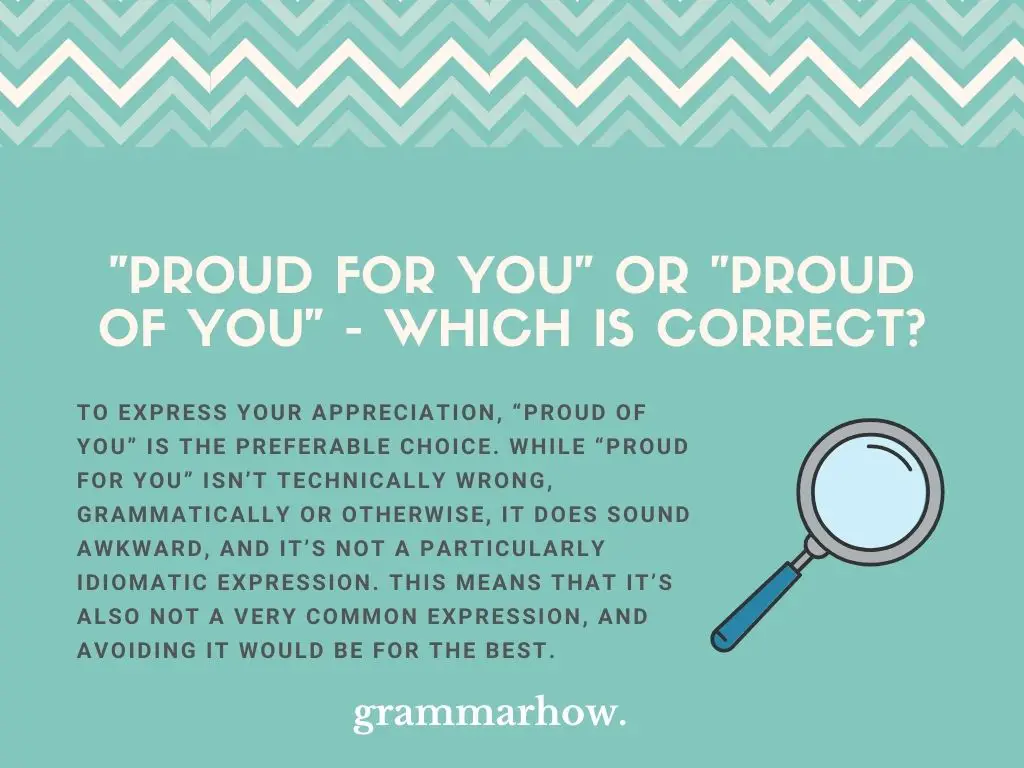Sometimes, you’ll want to express that you really respect and admire someone, or what they have done. But when you come to this situation, should you say “proud for you”? Or would “proud of you” be the preferable alternative? This article will handily answer these questions.
“Proud For You” or “Proud Of You” – Which Is Correct?
To express your appreciation, “proud of you” is the preferable choice. While “proud for you” isn’t technically wrong, grammatically or otherwise, it does sound awkward, and it’s not a particularly idiomatic expression. This means that it’s also not a very common expression, and avoiding it would be for the best.

“Proud for you” is the sort of expression that a non-native English speaker might use, as they might not be completely certain of what prepositions work best in what scenarios.
However, in basically all cases it’s recommended that you use “proud of you”, as it’s an actually common expression and will not sound awkward to the average ear.
They are technically interchangeable, in the sense that “proud for you” is not wrong and conveys the same idea, but it’s also best avoided.
Is “Proud For You” Grammatically Correct?
One could make the argument that “proud for you” is technically not grammatically incorrect. However, for the sake of this article that aims to teach grammar that goes beyond “correct” and sounds natural, we will say it’s generally incorrect to use.
Because “proud of you” is the preferred form for this expression, by comparison “proud for you” sounds odd and unnatural, and might cause some momentary confusion in people. Therefore, you shouldn’t use it.
Here are a few examples that will show you sentences to display how unnatural this expression looks like:
- Incorrect: She’s very proud for you and you should show at least some appreciation.
- Incorrect: I’m proud for you, because of all the great things you have accomplished lately.
- Incorrect: We’re all proud for her but we think that she should be a little more prudent in her life.
- Incorrect: He’s proud for you, trust me, he just has a hard time showing it sometimes.
How Prevalent Is The Use Of “Proud For You”?
According to data sourced by the Google Ngram Viewer, “proud for you” is practically fully unused, and displays basically no changes in use since the year 1800. There is a minimal percentage of texts that use “proud for you”, but they are ridiculously small in amount.

The information showcases other things, as well. “Proud of you” has been in use since the year 1800, and its use remained consistent until the 1970s.
In the 1970s, for some unexplained reason, use of “proud of you” spiraled, and grew to the dazzling heights that it holds in the modern day.
Use of “proud of you” peaked in the year 2016, and decreased slightly in the years that followed, though it’s impossible to know whether it will make up that small difference.
What Does “Proud Of You” Mean?
“Proud of you” is an expression that one should use when you want to convey to someone else that you really respect and admire something that they’ve accomplished. This phrase tends to be used in celebratory contexts, to commemorate success or incredible events.
When you say “proud of you”, you’re letting the other person know that you’ve witnessed the change that they’ve gone through or accomplished, and that you are amazed and pleased with it.
Here are a few example sentences that will show you how to use “proud of you” in a sentence with ease:
- I’m so proud of you, it’s really amazing what you’ve accomplished in such little time.
- She’s very proud of you, I’m sure she’ll come right over to congratulate you in person.
- I’m really proud of you, you pulled through when no one else would and got us through this.
- He’s proud of you, I don’t know if you’ve seen him today yet but he was beaming with happiness.
- I’m proud of you, believe it or not, because I know that what you’ve done wasn’t easy.
- I’ve wanted to be proud of you for so long, and now I can finally be proud of you.
- She’ll be proud of you very soon, you just have to show her why she should be.
Final Thoughts
It’s easy to confuse prepositions. However, “proud of you” is an expression that is always correct, and “proud for you”, while technically not incorrect grammatically, is nonetheless incorrect in terms of popularity and use. You should always say “proud of you”.
You may also like:
10 Ways To Say “I’m Proud Of You” To Someone Who Deserves It
Proud To Be or Proud Of Being – What’s the Difference?

Martin holds a Master’s degree in Finance and International Business. He has six years of experience in professional communication with clients, executives, and colleagues. Furthermore, he has teaching experience from Aarhus University. Martin has been featured as an expert in communication and teaching on Forbes and Shopify. Read more about Martin here.

